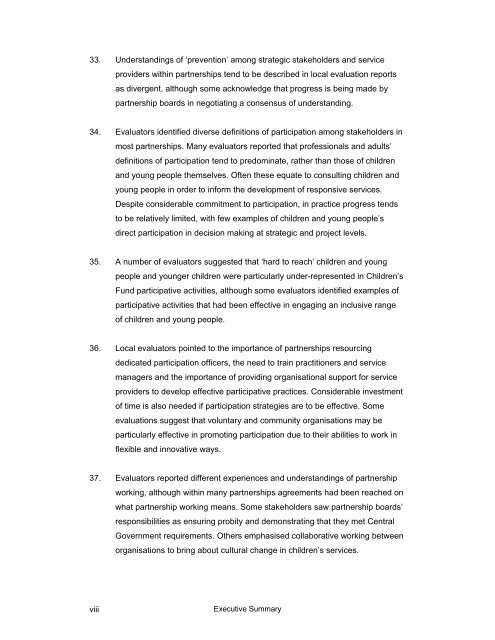Local Evaluation of Children's Services Learning from the Children's ...
Local Evaluation of Children's Services Learning from the Children's ...
Local Evaluation of Children's Services Learning from the Children's ...
- No tags were found...
You also want an ePaper? Increase the reach of your titles
YUMPU automatically turns print PDFs into web optimized ePapers that Google loves.
33. Understandings <strong>of</strong> ‘prevention’ among strategic stakeholders and serviceproviders within partnerships tend to be described in local evaluation reportsas divergent, although some acknowledge that progress is being made bypartnership boards in negotiating a consensus <strong>of</strong> understanding.34. Evaluators identified diverse definitions <strong>of</strong> participation among stakeholders inmost partnerships. Many evaluators reported that pr<strong>of</strong>essionals and adults’definitions <strong>of</strong> participation tend to predominate, ra<strong>the</strong>r than those <strong>of</strong> childrenand young people <strong>the</strong>mselves. Often <strong>the</strong>se equate to consulting children andyoung people in order to inform <strong>the</strong> development <strong>of</strong> responsive services.Despite considerable commitment to participation, in practice progress tendsto be relatively limited, with few examples <strong>of</strong> children and young people’sdirect participation in decision making at strategic and project levels.35. A number <strong>of</strong> evaluators suggested that ‘hard to reach’ children and youngpeople and younger children were particularly under-represented in Children’sFund participative activities, although some evaluators identified examples <strong>of</strong>participative activities that had been effective in engaging an inclusive range<strong>of</strong> children and young people.36. <strong>Local</strong> evaluators pointed to <strong>the</strong> importance <strong>of</strong> partnerships resourcingdedicated participation <strong>of</strong>ficers, <strong>the</strong> need to train practitioners and servicemanagers and <strong>the</strong> importance <strong>of</strong> providing organisational support for serviceproviders to develop effective participative practices. Considerable investment<strong>of</strong> time is also needed if participation strategies are to be effective. Someevaluations suggest that voluntary and community organisations may beparticularly effective in promoting participation due to <strong>the</strong>ir abilities to work inflexible and innovative ways.37. Evaluators reported different experiences and understandings <strong>of</strong> partnershipworking, although within many partnerships agreements had been reached onwhat partnership working means. Some stakeholders saw partnership boards’responsibilities as ensuring probity and demonstrating that <strong>the</strong>y met CentralGovernment requirements. O<strong>the</strong>rs emphasised collaborative working betweenorganisations to bring about cultural change in children’s services.viiiExecutive Summary
















